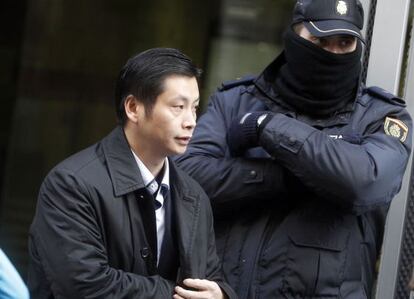Auditors sent in to Banco de Madrid after laundering probe launched in US
Treasury Department suspects parent company Banca Privada d’Andorra assisted criminals

Spain’s central bank has begun investigating accounts at Banco de Madrid after US law enforcement authorities on Tuesday took action against its parent company, Banca Privada d’Andorra, for suspected money-laundering activities.
Two central bank auditors, José Luis Gracia Cáceres and Alejandro Gobernado Hernández, are also investigating if suspicious financial transactions took place at Banco de Madrid by some of its clients.
Antoni Martí, the head of Andorra’s government, also asked local prosecutors to investigate BPA
The US Treasury’s anti-money-laundering unit, Financial Crimes Enforcement Network (FinCEN), announced that Banca Privada d’Andorra (BPA) was “a primary money laundering concern” and asked federal regulators to prohibit any type of transaction with the bank.
BPA Group entered the Spanish market after purchasing Banco de Madrid from Kutxabank in 2011 for €100 million. The Spanish affiliate has a board of directors that operates independently from its parent company and is supervised by the central bank.
In the Pyrenean principality, the Andorran National Institute of Finances took over BPA’s operations following the US complaint. Antoni Martí, the head of Andorra’s government, also asked local prosecutors to investigate BPA.
Banco de Madrid officials reacted calmly to the complaint filed in the United States because they are convinced no money laundering took place at the lender, according to central bank sources. The auditors also want to “guarantee that the bank’s daily operations continue” while they sift through the lender’s transactions.
BPA has been in the news in recent months after former Catalan premier Jordi Pujol revealed that his family inherited a fortune from his father Florenci, with the funds held in an account at the Andorran lender. Last July, the former premier released a public statement acknowledging the existence of foreign accounts and admitted paying fines to settle the irregular situation with Spanish tax authorities.
A Barcelona judge, who is investigating the Pujol family and the offshore accounts, has asked BPA for its cooperation in the inquiry. According to police reports, Pujol held up to €4 million at BPA.
Ex-Catalan premier Jordi Pujol revealed that his family inherited a fortune from his father held at BPA
“BPA's corrupt high-level managers and weak anti-money-laundering controls have made BPA an easy vehicle for third-party money launderers to funnel proceeds of organized crime, corruption, and human trafficking through the US financial system,” said FinCEN Director Jennifer Shasky Calvery in a statement released on Tuesday.
FinCEN said that several high-level BPA managers worked with suspected money-launderers in Spain, such as Chinese businessman Gao Ping and Russian real estate businessman Andrei Petrov, to hide proceeds originating from their criminal activities.
Ping, who was said to be the leader of a large criminal conspiracy, was arrested in September 2012 in the massive Operation Emperor case. He is being held in custody in Spain.
“Ping acted on behalf of a transnational criminal organization engaged in trade-based money laundering and human trafficking and established relationships with Andorran banks to launder money on behalf of his organization and numerous Spanish businesspersons,” FinCEN said in its complaint. “Through his associate, Ping bribed Andorran bank officials to accept cash deposits into less scrutinized accounts and transfer the funds to suspected shell companies in China.”
Petrov – whom investigators believe is linked to to Semion Mogilevich, a Ukranian national on the FBI’s 10 most-wanted list – was arrested in February 2013 in connection with a public corruption case involving the former mayor of Lloret, Xavier Crespo, who now serves as a deputy in the Catalan parliament under the ruling nationalist CiU bloc.
BPA may have worked with suspected launderers in Spain, such as Gao Ping and Andrei Petrov
According to US Treasury investigators, Petrov “used the proceeds of transnational organized crime to bribe local officials in Spain” and “secured beneficial zoning rights and contracts from a local official” in Catalonia.
“After Petrov’s application for a line of credit at a Spanish bank was rejected, [a BPA] high-level manager ensured that Petrov could obtain a line of credit from another Spanish bank and that the application would not be perceived as suspicious,” FinCEN said.
Petrov stands accused of helping launder some €56 million in proceeds from Russian criminal organizations.
US Treasury investigators also say in their complaint that high-level government officials in Venezuela, working with local businessmen and an Andorran lawyer, helped establish shell companies in Panama to launder some $2 billion through BPA disguised as transactions from the state-oil company Petroleós de Venezuela (Pdvsa), with approximately $50 million passing through the US banking system.
“It is difficult to assess on the information available the extent to which BPA is used for legitimate business purposes,” the FinCEN director wrote in her complaint. “BPA provides services to high-risk customers including international foreign-operated shell companies, businesses likely engaged in unlicensed money transmission, and senior foreign political officials.”
Tu suscripción se está usando en otro dispositivo
¿Quieres añadir otro usuario a tu suscripción?
Si continúas leyendo en este dispositivo, no se podrá leer en el otro.
FlechaTu suscripción se está usando en otro dispositivo y solo puedes acceder a EL PAÍS desde un dispositivo a la vez.
Si quieres compartir tu cuenta, cambia tu suscripción a la modalidad Premium, así podrás añadir otro usuario. Cada uno accederá con su propia cuenta de email, lo que os permitirá personalizar vuestra experiencia en EL PAÍS.
¿Tienes una suscripción de empresa? Accede aquí para contratar más cuentas.
En el caso de no saber quién está usando tu cuenta, te recomendamos cambiar tu contraseña aquí.
Si decides continuar compartiendo tu cuenta, este mensaje se mostrará en tu dispositivo y en el de la otra persona que está usando tu cuenta de forma indefinida, afectando a tu experiencia de lectura. Puedes consultar aquí los términos y condiciones de la suscripción digital.








































